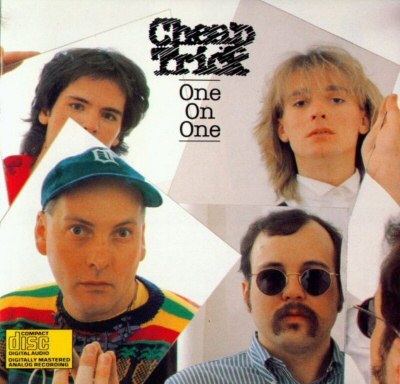
One On One (1982)

1.I Want You
2.One On One
3.If You Want My Love
4.Ooh La La
5.Looking Out For Number One
6.She's Tight
7.Time is Runnin'
8.Saturday at Midnight
9.Love's Got a Hold On Me
10.I Want Be Man
11.Four Letter Word
By 1982, the aftershocks of All Shook Up were still reverberating through Cheap Trick’s career. That record, produced by George Martin no less,
had proven divisive—too ambitious for the mainstream, too uneven for the critics. One on One was both a course correction and a new gamble. Gone was Tom Petersson,
the band's long-standing bassist and visual focal point. In his place—eventually—stood Jon Brant, though even his presence on the record is more symbolic than substantial.
He only appears on three of the eleven tracks, and the album cover, which buries half his face in shadow, almost seems to acknowledge this transitional limbo. It’s as if the band were unsure whether to introduce him or hide him.
The production helm was handed to Roy Thomas Baker, best known for his work with such bands as Journey, Foreigner, Queen and The Cars. His fingerprints are all over this record: stacked vocals, thundering drums,
and a fierce sonic compression that leaves no space for ambiguity. Cheap Trick had always flirted with volume and intensity, but here they commit fully. The result is an album of lean, loud, short
blasts—songs that often feel more like declarations than compositions. If All Shook Up was cerebral, One on One is visceral.
It is also, at first glance, exhausting. Robin Zander’s voice, always a versatile instrument, is pushed to its ragged edge. He doesn’t so much sing as growl. The drums—mixed absurdly high,
even for the era—pummel rather than propel. And yet, buried within this wall of sound are flashes of brilliance. If You Want My Love is arguably the band’s finest ballad, a masterclass
in melody and melancholy. It failed to chart in the U.S., but soared in Australia—a fitting irony for a band that never quite received its due at home. She’s Tight, meanwhile, is pure bubblegum sleaze,
anchored by a riff as sticky as it is simple. Both tracks offer the kind of pop precision that once defined Cheap Trick at their peak.
Elsewhere, the songs blur together—a mix of crunch and filler, energetic but often directionless. The lack of memorable choruses or lyrical finesse dulls the record’s staying power.
In prioritizing power over pop, the band sacrifices some of their identity. Still, it’s a tighter and more consistent album than its predecessor, and hindsight has been kinder to it than contemporary reviewers were.
Commercially, the album marked a modest rebound. It scraped into the Top 40, and the band returned to arena touring—albeit in smaller markets and half-filled venues. The heyday was behind them,
but One on One suggested they weren’t finished just yet. It may not be a triumph, but it is a statement: loud, relentless, and unapologetically alive.
Go back to the main page
Go To Next Review